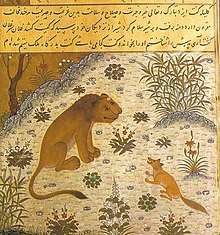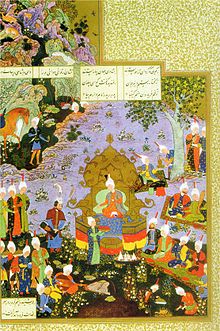波斯文學
此條目可參照外語維基百科相應條目來擴充。 (2017年6月18日) |
此條目需要補充更多來源。 (2017年6月18日) |
波斯文學(波斯語:ادبیات فارسی adabiyāt-e fārsi)包括由波斯語轉述、寫作而成的文字作品,是世界上最為古老的文學之一。[1][2][3]它綿延了兩千五百餘年,但許多伊朗歷史相關的作品如今卻已經失傳。波斯文學作品的創作題材來自於大伊朗地區,範圍包括今天的伊朗、伊拉克、高加索和土耳其,以及波斯語曾為官方語言或本土語言的部分中、南亞等地區。


拜火教帕拉維語文獻
編輯中古波斯古典文學
編輯初創期(九世中~十一世中)
編輯發展期(十一世中~十三世中)
編輯鼎盛期(十三世中~十五世末)
編輯- 《瑪斯納維》
- 薩迪(Саъдй Шерозй, 1208~1292)《果園》、《薔薇園》
- 哈菲茲(Хофиз, 1327~1390)
衰退期(十六世~十九世末)
編輯- 巴哈爾
現當代伊朗文學
編輯- 赫達雅特
- 沙赫爾努希·帕爾西普爾
波斯諺語舉例
編輯* Thousands of friends aren't sufficient and one enemy one too many. *
|
هزاران دوست کماند و یک دشمن زیاد
Hezārān dūst kam-and-o [va] yek doshman ziād. |
* The wise enemy is better than the ignorant friend. *
|
دشمن دانا بهتر از دوست نادان است
Doshman-e dānā beh'tar az dust-e nādān ast./ |
* The wise enemy lifts you up, the ignorant friend casts you down. *
|
دشمن دانا بلندت میکند. بر زمینت میزند ناداندوست
Doshman-e dānā bolandat mikonad. Bar zaminat mizanad nādān-dūst. |
* There is no dead in the grave, on top of which you're crying! (equivalent to "barking up the wrong tree" ) *
|
در قبری که بالایش می گریی، مرده نیست
Dar qabrī ke bālāyash mīger'yī morde nīst |
參考資料
編輯- ^ Spooner, Brian. Dari, Farsi, and Tojiki. Marashi, Mehdi (編). Persian Studies in North America: Studies in Honor of Mohammad Ali Jazayery. Leiden: Brill. 1994: 177–178 [2017-06-18]. (原始內容存檔於2020-07-14).
- ^ Spooner, Brian. Dari, Farsi, and Tojiki. Schiffman, Harold (編). Language policy and language conflict in Afghanistan and its neighbors: the changing politics of language choice. Leiden: Brill. 2012: 94 [2017-06-18]. (原始內容存檔於2021-03-10).
- ^ Campbell, George L.; King, Gareth (編). Persian. Compendium of the World's Languages 3rd. Routledge. 2013: 1339 [2017-06-18]. (原始內容存檔於2021-03-10).
參考文獻
編輯- Farmanfarmaian, Fatema Soudavar. Arjomand, Saïd Amir , 編. Georgia and Iran: Three Millennia of Cultural Relations An Overview. Journal of Persianate Studies (BRILL). 2009, 2 (1): 1–43. doi:10.1163/187471609X445464.
延伸閱讀
編輯- ʻAbd al-Ḥusayn Zarrīnʹkūb. Dū qarn sukūt: sarguz̲asht-i ḥavādis̲ va awz̤āʻ-i tārīkhī dar dū qarn-i avval-i Islām (Two Centuries of Silence). Tihrān: Sukhan. 2000. OCLC 46632917. ISBN 964-5983-33-6.
- Aryanpur, Manoochehr. A History of Persian Literature. Tehran: Kayhan Press, 1973
- Chopra, R.M., "Eminent Poetesses of Persian", Iran Society, Kolkata, 2010.
- Chopra, R.M., "The Rise Growth And Decline of Indo-Persian Literature", 2012, published by Iran Culture House, New Delhi and Iran Society, Kolkata. Revised edition published in 2013.
- Zellem, Edward. Zarbul Masalha: 151 Afghan Dari Proverbs. Charleston: CreateSpace, 2012. [2022-01-07]. (原始內容存檔於2014-12-31).
- Clawson, Patrick. Eternal Iran (頁面存檔備份,存於網際網路檔案館). Macmillan, 2005. ISBN 1-4039-6276-6.
- Browne, E.G.. Literary History of Persia 1998. ISBN 0-7007-0406-X.
- Browne, Edward G.. Islamic Medicine. 2002. ISBN 81-87570-19-9
- Rypka, Jan. History of Iranian Literature. Reidel Publishing Company, 1968. OCLC 460598. ISBN 90-277-0143-1.
- Schimmel, Annemarie (1992). A Two-colored Brocade: The Imagery of Persian Poetry (頁面存檔備份,存於網際網路檔案館). University of North Carolina Press, USA. ISBN 1469616378.
- Tikku, G.L. Persian Poetry in Kashmir. 1971. ISBN 0-520-09312-7
- Walker, Benjamin. Persian Pageant: A Cultural History of Iran. Calcutta: Arya Press, 1950.
- Zellem, Edward. Afghan Proverbs Illustrated. Charleston: CreateSpace, 2012. [2022-01-07]. (原始內容存檔於2014-12-31).
- Chopra, R.M., "Great Poets of Classical Persian", 2014, Sparrow Publication, Kolkata, ISBN 978-81-89140-99-1.
外部連結
編輯- National Committee for the Expansion of the Persian Language and Literature (頁面存檔備份,存於網際網路檔案館) (شورای گسترش زبان و ادبیات فارسی)
- The Packard Humanities Institute: Persian Literature in Translation (currently down) (latest archived version)
- Persian literature (頁面存檔備份,存於網際網路檔案館) at Encyclopædia Britannica
- Persian Literature & Poetry (頁面存檔備份,存於網際網路檔案館) at parstimes.com
template:Persian literature template:Shahnameh template:Poetry of different cultures and languages literature